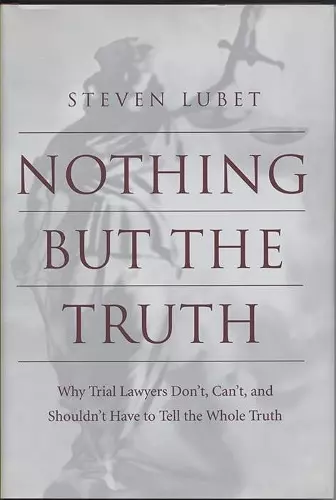Nothing but the Truth
Why Trial Lawyers Don't, Can't, and Shouldn't Have to Tell the Whole Truth
Format:Hardback
Publisher:New York University Press
Published:1st Mar '01
Currently unavailable, and unfortunately no date known when it will be back
This hardback is available in another edition too:
- Paperback£23.99(9780814751749)

Lubet's Nothing But The Truth presents a novel and engaging analysis of the role of storytelling in trial advocacy. The best lawyers are storytellers, he explains, who take the raw and disjointed observations of witnesses and transform them into coherent and persuasive narratives.
Critics of the adversary system, of course, have little patience for storytelling, regarding trial lawyers as flimflam artists who use sly means and cunning rhetoric to befuddle witnesses and bamboozle juries. Why not simply allow the witnesses to speak their minds, without the distorting influence of lawyers' stratagems and feints?
But Lubet demonstrates that the craft of lawyer storytelling is a legitimate technique for determining the truth andnot at all coincidentallyfor providing the best defense for the attorney's client. Storytelling accomplishes three important purposes at trial. It helps to establish a "theory of the case," which is a plausible and reasonable explanation of the underlying events, presented in the light most favorable to the attorney's client. Storytelling also develops the "trial theme," which is the lawyer's way of adding moral force to the desired outcome. Most importantly, storytelling provides a coherent "story frame," which organizes all of the events, transactions, and other surrounding facts into an easily understandable narrative context.
As with all powerful tools, storytelling may be misused to ill purposes. Therefore, as Lubet explains, lawyers do not have carte blanche to tell whatever stories they choose. It is a creative process to be sure, but every story must ultimately be based on "nothing but the truth." There is no room for lying.
On the other hand, it is obvious that trial lawyers never tell "the whole truth," since life and experience are boundless and therefore not fully describable. No lawyer or court of law can ever get at the whole truth, but the attorney who effectively employs the techniques of storytelling will do the best job of sorting out competing claims and facts, thereby helping the court arrive at a decision that serves the goals of accuracy and justice.
To illustrate the various challenges, benefits, and complexities of storytelling, Lubet elaborates the stories of six different trials. Some of the cases are real, including John Brown and Wyatt Earp, while some are fictional, including Atticus...
"Steven Lubetlawyer, teacher, and raconteurhas written a great book. He makes us think about how we can use trials to advance justicethe most important of human pursuits." -- Michael E. Tigar,Professor of Law and Edwin A. Mooers, Sr. Scholar in Law, American University, Washington College of Law
"This excellent set of essays, both scholarly and imaginative, offers a rare bridge between the parallel universes of legal scholarship and courtroom practice. There is no better guide to the enterprise of storytelling in the law than Steve Lubet." -- Marianne Wesson,Professor of Law, University of Chicago
"Lubet has managed to spin an engaging tale that includes a Pope, gunslingers, and lawyers. Most of the time, the lawyers are actually the good guys. This book will serve those who already practice the law, plan to do so, watch Court TV, or like a story well told." -- Christopher Harper,Roy H. Park Distinguished Chair, School of Communications, Ithaca College
"A delightful and insightful book [that] entertains as it instructs." * ABA Journal *
"Lubet's ability to downplay advocacy techniques while emphasizing the rich context of facts, story, and personalities is superb." * Choice *
ISBN: 9780814751732
Dimensions: unknown
Weight: 454g
219 pages